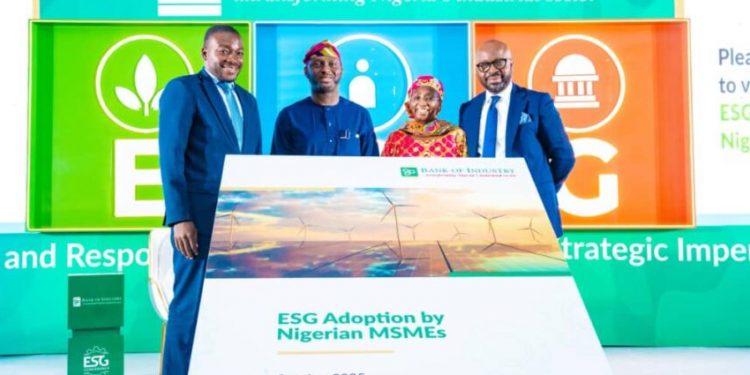The Bank of Industry (BOI) has identified limited funding and a lack of technical capacity as the major obstacles hindering the adoption of Environmental, Social, and Governance (ESG) principles among Nigerian micro, small, and medium enterprises.
The bank made this known during the launch of its report, Environmental, Social and Governance Adoption by Nigerian Micro, Small and Medium Enterprises, unveiled at its inaugural ESG Conference in Lagos. Themed Advancing ESG Adoption, the report aims to highlight the challenges and opportunities facing Nigerian MSMEs in integrating sustainability practices into their operations.
According to the BOI statement released on Tuesday, the survey—conducted across all six geopolitical zones—captured over 300 valid responses from enterprises in sectors including agro-processing, ICT, manufacturing, creative industries, healthcare, construction, and financial services. The findings revealed that 78 per cent of MSMEs cited financial limitations, while 65 per cent pointed to a lack of technical expertise as barriers to ESG adoption.
The report further showed that 65 per cent of respondents mentioned inadequate ESG-oriented incentives, 45 per cent admitted to having limited knowledge, and 20 per cent highlighted low customer demand. These findings, according to BOI, indicate that market forces alone are insufficient to drive ESG adoption without deliberate policy and institutional support.
The report also proposed key improvement areas such as developing ESG-compliant financial products with targeted loan features, offering capacity-building programmes, establishing regional hubs for technical upskilling, and introducing women-focused ESG credit schemes to bridge the gender gap. It also recommended leveraging blended finance to improve access to ESG-linked capital.
Speaking at the event, BOI Managing Director and Chief Executive Officer, Dr Olasupo Olusi, said that MSMEs make up more than 80 per cent of Nigerian businesses, contribute nearly half of the country’s GDP, and employ millions. However, many remain uncertain about how to implement ESG principles in practical ways.
“These barriers make enterprises more vulnerable, less competitive, and less future-ready,” Olusi said. “Our goal at BOI is to bridge this gap by equipping MSMEs to grow, compete, and prosper sustainably and profitably in today’s global economy.”
Olusi noted that the report aligns with Nigeria’s commitments under the Paris Agreement, the Nationally Determined Contributions, and the Energy Transition Plan, which targets a 47 per cent conditional reduction in emissions by 2030. He added that adopting ESG principles would improve access to finance, help businesses manage risks, reduce operational costs, attract talent, and ensure compliance with emerging global standards.
“ESG principles will help us align our industrial ambitions with national and global climate goals, while enabling us to attract green capital, spur innovation, and build industries that can compete globally,” Olusi stated.
He stressed that broader ESG adoption is essential for Nigeria’s industrialisation and long-term growth, particularly as clean energy, resource efficiency, workplace safety, and responsible governance form the bedrock of sustainable development.
In her keynote address, Director-General of the National Council on Climate Change, Tenioye Majekodunmi, noted that climate realities, changing investor expectations, and technological shifts are reshaping global economies. She explained that global investors are channeling trillions of dollars toward sustainable assets and that Nigerian businesses that integrate ESG principles early will be better positioned for global trade and financing opportunities.
Majekodunmi described the BOI’s ESG framework for MSMEs as a national model for responsible industrial growth. “By aligning its lending and investment practices with global ESG and sustainable finance standards, BOI is setting a new benchmark that positions Nigerian enterprises to access green and sustainable finance both locally and internationally,” she said.
Deputy Country Director of Agence Française de Développement (AFD) Nigeria, Mahamadou Diarra, also commended BOI’s leadership in advancing responsible financing. He said that BOI’s initiatives will enhance its credibility with global development partners such as the World Bank and the Asian Development Bank, which are working to harmonise ESG and due diligence standards.
Diarra reaffirmed AFD’s commitment to supporting BOI in strengthening its ESG management systems and promoting climate-related investments in Nigeria, emphasising that all supported institutions must uphold high environmental and social diligence standards.
As Nigeria’s primary development finance institution, BOI continues to focus on driving industrialisation and private-sector growth by providing long-term financing, advisory services, and strategic interventions. Through initiatives such as the ESG framework, the bank seeks to foster an inclusive, responsible, and sustainable business environment for MSMEs nationwide.










